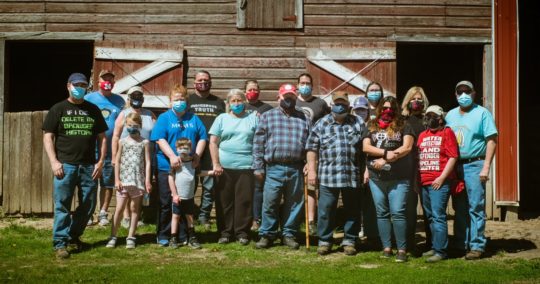State Department Issues Statement on New Supplemental Study:
Groups Call on Elected Leaders to Take Immediate Action to Protect Land and Water
Who: Nebraska Sierra Club, Bold Nebraska, Nebraska Wildlife Federation, Nebraska Green Party, 350.org, Nebraskans for Peace, Guardians of the Good Life
When: Wed, March 16th, 2:30pm
Where: Capitol Rotunda
Background: Groups will stand as one voice at a press conference on Wed, March 16th to continue their call for safety regulations, passage of pipeline bills and for increased state leadership on providing an alternative route for the TransCanada Keystone XL pipeline.
“We welcome the news from the US State Department on a Supplemental Environmental Impact Study,” declared Duane Hovorka with Nebraska Wildlife Federation. “However, we want to be clear, our state elected officials must now lead by providing an alternative route for the risky TransCanada pipeline.”
After hearing the state pipeline bills were not going anywhere this year, Ken Winston with Nebraska Sierra Club stated, “I never thought I would see the day when some members of our Unicameral would stand with a foreign company over Nebraska’s landowners and taxpayers. States have a clear role in pipeline regulations. We can’t allow a foreign company to dictate what is best for our state’s resources. In particular, Senator Sullivan’s bill (LB 629) is merely intended to protect Nebraska landowners and taxpayers from paying the costs of cleaning up a pipeline leak. A broad range of individuals and organizations support the legislation. It’s time to pass these bills out of committee.”
The press conference will also briefly address State Senator Langemeier’s quote in a recent Lincoln Journal Star article that one of the reasons the committee was not advancing any of the pipeline safety bills was because groups like Bold Nebraska could intentionally damage the pipeline, and then TransCanada would be responsible for the cost of the clean-up.
“Senator Langemeier’s accusation that our non-profit group would commit violence is just wrong,” said Jane Kleeb, Bold Nebraska Director. “To use us as an excuse for his committee’s inaction on common sense legislation is shameful. We can disagree about the merits of the TransCanada pipeline, but the majority of Nebraskans agree with us that state-based regulations must be put in place for oil pipelines.”
Pictures and Videos: Click here for pictures, videos and other resources to use in your story
State Department: The media advisory from the State Department announcing a Supplemental Environmental Impact Study and process for granting or denying permit is below.
LJS covers the story with extensive quotes from Senator Johanns.
OWH covers the story with quotes from Bold about role of state elected officials.
State Department Announces Next Steps in Keystone XL Pipeline Permit Process
The U.S. Department of State expects to request public comment on a Supplemental Draft Environmental Impact Statement (EIS) for the proposed Keystone XL pipeline in mid-April. The Supplemental EIS will seek public comment on issues that will benefit from further public input. A Federal Register notice, to be issued in the mid-April time period, will provide further details.
Keystone XL is a proposed 1700-mile oil pipeline from the U.S.-Canadian border in Montana, through Cushing, Oklahoma, to refineries on the U.S. Gulf Coast.
In order to provide interested parties and the public the maximum opportunity to comment on this important project, the Department will continue to solicit public comment. The State Department has held over 20 public comment meetings along the pipeline route in Montana, South Dakota, Nebraska, Oklahoma, and Texas, as well as in Washington, D.C.
The public will have 45 days to comment on the Supplemental Draft EIS after the anticipated mid-April comment period begins. Following issuance of a Final EIS, the State Department will solicit public comment and host a public meeting in Washington, D.C., before it makes a determination under Executive Order 13337 on whether issuance of this permit is in the U.S. national interest.
The U.S. Department of State expects to make a decision on whether to grant or deny the permit before the end of 2011.



